In 2024, finding love poses challenges due to shifting societal norms, hookup culture, pervasive dating apps, communication hurdles, media ideals, emotional unavailability, ghosting, inauthentic online interactions, and pressure to conform. Society's evolving expectations, hookup culture's preference for casual encounters, dating apps' impact on romance dynamics, and communication obstacles hinder forming meaningful connections. Unrealistic media depictions, partners' emotional unavailability, ghosting, breadcrumbing, inauthentic online personas, and societal relationship pressures further complicate modern dating. Exploring these issues reveals why love may be harder to navigate in the current landscape, shedding light on the intricacies of contemporary relationship dynamics.
Key Takeaways
- Changing societal norms complicate relationship dynamics.
- Rise of hookup culture reduces commitment in dating.
- Dating apps foster unrealistic expectations and burnout.
- Communication challenges hinder emotional intimacy in relationships.
- Fear of commitment and ghosting impact modern dating experiences.
Changing Societal Norms Impact Dating
Changing societal norms are making it increasingly challenging to navigate the dating scene, impacting how individuals approach relationships and seek connections.
In the domain of modern dating, the rise of dating apps has revolutionized the way people meet potential partners. This shift has led to a greater emphasis on quick judgments based on profiles and photos, changing the initial stages of relationship building. Additionally, the acceptance of diverse relationship forms beyond traditional monogamy has created a more complex dating landscape, where individuals must navigate varying expectations and boundaries.
Gender stereotypes continue to influence dating dynamics, affecting how individuals express their desires and expectations in relationships. Furthermore, cultural expectations play a significant role in shaping dating choices, adding layers of complexity to relationship dynamics.
The pressure from family and peers to conform to societal norms can further complicate the dating experience, influencing decisions and creating additional challenges in finding genuine connections. As a result, individuals face a multitude of factors that influence their dating behaviors and preferences in the modern dating world.
Rise of Hookup Culture
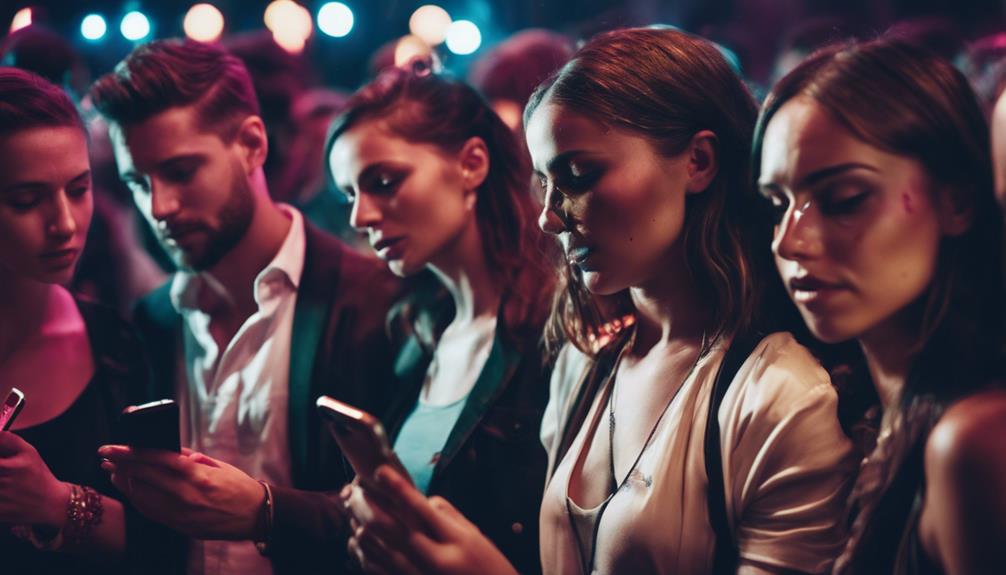
Hookup culture, characterized by casual sexual encounters, has notably impacted modern relationships.
The shift towards quick, non-committal interactions often leads to a preference for casual over committed relationships among young adults.
This trend can result in challenges regarding communication and emotional attachment, making it harder to form meaningful connections in today's dating landscape.
Impact on Relationships
The surge in casual sexual encounters has greatly altered the landscape of modern relationships, particularly among younger adults. The rise of hookup culture has shifted the focus from traditional dating to more casual, short-term interactions. This shift is especially prevalent among young adults, with studies indicating that hookup culture is commonly found in college settings.
Dating apps and social media platforms have played a significant role in normalizing casual hookups, often prioritizing physical pleasure over emotional connection.
As a result of hookup culture, challenges arise in forming meaningful and long-lasting relationships. Critics argue that this trend can lead to feelings of loneliness, superficial interactions, and a lack of commitment in modern relationships. The emphasis on instant gratification and physical enjoyment can hinder the development of deeper emotional bonds, impacting the overall quality and longevity of relationships in today's society.
Casual Vs. Committed
In the world of modern dating, the trend towards casual relationships has greatly overshadowed the prevalence of committed ones. This shift in dynamics has been fueled by the rise of hookup culture, where individuals often opt for casual dating over committed relationships.
When considering the landscape of casual vs. committed relationships, several key points emerge:
- Casual dating is on the rise, with more young adults leaning towards non-committal interactions.
- The allure of casual encounters can hinder the development of deep emotional connections.
- Committed relationships, known for exclusivity and long-term dedication, are becoming less common.
- The prevalence of casual hookups in today's dating scene presents challenges for those seeking meaningful and committed partnerships.
These factors highlight a significant shift in dating patterns, where the traditional notions of commitment and exclusivity are being redefined in the face of hookup culture's growing influence.
Communication Challenges
Amidst the prevalence of casual dating and the decline in committed relationships, one notable consequence is the erosion of meaningful communication due to the rise of hookup culture.
The shift towards casual encounters in hookup culture has led to a decrease in emotional connections and genuine conversations in modern dating scenarios. Research indicates that approximately 80% of college students have engaged in hookups, highlighting the importance of physical intimacy over establishing deep emotional bonds.
Dating apps further perpetuate this trend by promoting instant gratification and casual encounters, often lacking in-depth communication that's vital for building lasting relationships. The normalization of casual sex within hookup culture can impede individuals from honing essential communication skills necessary for fostering strong emotional connections.
As hookup culture continues to shape the dating landscape, it poses significant challenges in developing meaningful communication channels and establishing genuine emotional ties between individuals.
Influence of Dating Apps
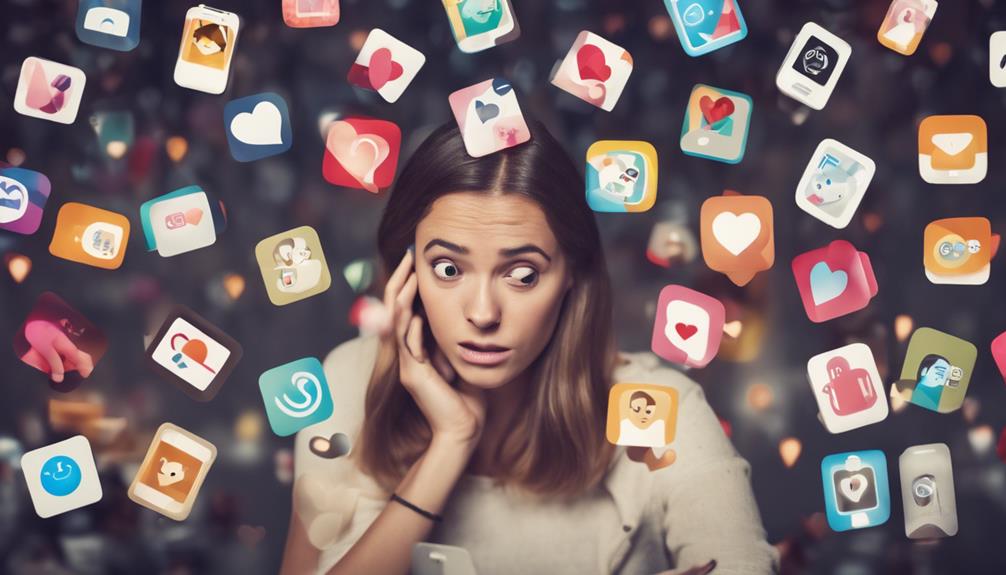
Dating apps have revolutionized the way people approach relationships, profoundly impacting the dynamics of modern romance. The influence of dating apps on mental health and well-being is significant, with statistics showing a 79% burnout rate among Gen Z individuals due to the online dating process.
Nearly half of Americans experience stress related to their love lives, highlighting the emotional toll that these platforms can take. In 2024, a guide comparing popular online dating platforms like Bumble and Tinder emphasizes the relevance and popularity of these apps in the current dating landscape.
Additionally, the availability of resources discussing the best free dating sites and methodologies for rating online dating platforms underscores the importance of making informed choices when navigating the world of virtual romance. As technology continues to shape the dating scene, it's essential for individuals to reflect on the impact of these tools on their mental well-being.
Communication Challenges in Relationships
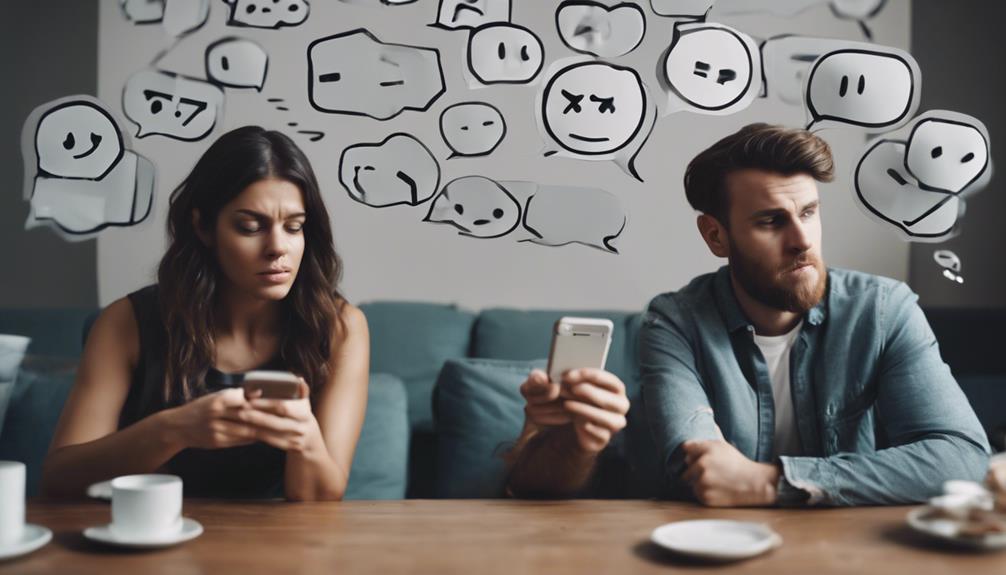
Digital distractions, such as constant notifications and social media, can impact the quality of communication in relationships, leading to misunderstandings and misinterpretations.
With the prevalence of technology in our daily lives, couples may find it challenging to fully engage in meaningful conversations and connect on a deeper level.
It's essential for partners to be mindful of how tech usage can interfere with effective communication, causing unintended conflicts and barriers to emotional intimacy.
Digital Distractions Impact Communication
Managing relationships in today's world presents a significant challenge due to the impact of digital distractions on communication dynamics. The prevalence of smartphones and constant connectivity has reshaped how individuals interact, often leading to barriers in effective communication. Consider the following effects of digital distractions on relationships:
- Decreased Quality Time: Studies reveal that 70% of Americans use their phones during meals, detracting from meaningful interactions.
- Notification Overload: The average person checks their phone 96 times a day, causing interruptions and hindering focused discussions.
- Empathy Decline: Smartphone presence during face-to-face interactions diminishes empathy and understanding, affecting the emotional connection.
- Misinterpretations: Reliance on texting over in-person conversations results in misunderstandings, impacting the depth of communication.
To overcome these challenges, individuals must implement mindful communication strategies to foster genuine connections and emotional intimacy in relationships.
Misinterpretation Due to Tech
Essential for individuals to be mindful of the potential pitfalls of relying solely on digital communication in relationships and to seek clarity and understanding through more direct forms of interaction. As a result, misinterpretation in relationships often arises from the limitations of technology, leading to communication challenges that can impact emotional connections and understanding between individuals.
In today's digital age, people may find themselves struggling to convey tone and context through text messages, which can result in misunderstandings. Emojis and abbreviations used in digital communication can further distort meanings and intentions, contributing to miscommunication between partners.
Overreliance on texting and social media interactions may hinder the development of emotional depth and connection in relationships, as the absence of non-verbal cues such as facial expressions and body language can lead to misinterpretations of emotions and intentions. Miscommunication via technology can amplify insecurities, trigger conflicts, and ultimately erode trust between individuals.
Unrealistic Expectations From Media

Media depictions of romance often set unrealistically high standards, influencing how individuals perceive and seek love in their own lives. This influence can shape expectations and behaviors, leading to difficulties in forming genuine connections. Consider the following effects of media influence on relationship expectations:
- TV and movies often portray idealized relationships, creating unattainable standards that many find challenging to meet.
- Romantic comedies tend to present love in a perfect light, distorting reality and affecting how people view their own relationships.
- Social media influencers frequently showcase flawless partnerships, adding to the pressure individuals feel to have a flawless love life.
- Comparing one's own romantic experiences to those depicted in media can lead to dissatisfaction and a sense of inadequacy, hindering the ability to appreciate genuine connections.
These portrayals can contribute to misconceptions about love and hinder authentic relationship-building, making it harder to navigate the complexities of modern dating.
Fear of Commitment in Modern Dating

Fear of commitment in modern dating is a prevalent issue affecting many individuals today. The fear stems from various factors, including past relationship traumas and uncertainties about long-term compatibility.
This trend has led to a rise in commitment phobia, casual hookup culture, and relationship uncertainty among daters.
Commitment Phobia Epidemic
With commitment phobia on the rise in modern dating, many individuals struggle to embrace long-term relationship commitments due to various underlying reasons. This fear of commitment is deeply rooted in modern dating dynamics, making it challenging for individuals to engage in lasting relationships.
The following factors contribute to the commitment phobia epidemic:
- Past Traumas: Previous relationship experiences often leave emotional scars, making individuals hesitant to commit for fear of repeating past pain.
- Desire for Independence: The need for personal space and autonomy can clash with the idea of committing to a long-term relationship, leading to commitment fears.
- Uncertainty about Compatibility: Doubts about being truly compatible with a partner can create anxiety about committing to a future together.
- Fear of Loss: The fear of losing personal freedom and autonomy within a committed relationship can trigger commitment phobia, hindering the growth of deep emotional connections.
Casual Hookup Culture
Casual hookup culture in modern dating often presents a significant challenge for individuals seeking long-term commitment in relationships. The prevalence of dating sites and social media platforms has facilitated a culture where casual encounters are common, leading to a fear of commitment among many individuals. The ease of connecting with others for short-term, superficial relationships has contributed to a mindset that prioritizes immediate gratification over long-lasting emotional bonds.
In this environment, commitment phobia can be exacerbated as individuals struggle to navigate the blurred lines between casual interactions and meaningful connections. The fear of commitment is often rooted in past relationship traumas or a desire for independence conflicting with societal expectations. This conflict creates uncertainty about long-term compatibility and societal pressures, making it difficult for individuals to fully invest in relationships.
The fear of losing personal autonomy or engaging in deep emotional connections hinders relationship growth, perpetuating a cycle of commitment apprehension in modern dating.
Relationship Uncertainty Trend
Exploring the modern dating landscape presents a challenge for many individuals due to the prevalent relationship uncertainty trend, which often stems from a fear of commitment and past relationship experiences.
This fear of commitment in modern dating can manifest in various ways, making it challenging for individuals to navigate the complexities of romantic relationships.
Here are some key points to ponder:
- Hesitance towards long-term relationships is a common issue in modern dating, leading to difficulties in establishing deep connections.
- Past relationship traumas can instill commitment phobia, causing individuals to fear vulnerability and emotional investment.
- Conflicting desires for independence and personal freedom can create tension when trying to balance individuality with the expectations of commitment in a relationship.
- Uncertainty about long-term compatibility can fuel the fear of commitment, making it hard for individuals to fully invest in a potential partner.
In this landscape of relationship uncertainty, finding love can become a hard time for those grappling with commitment fears and past emotional wounds.
Emotional Unavailability in Partners
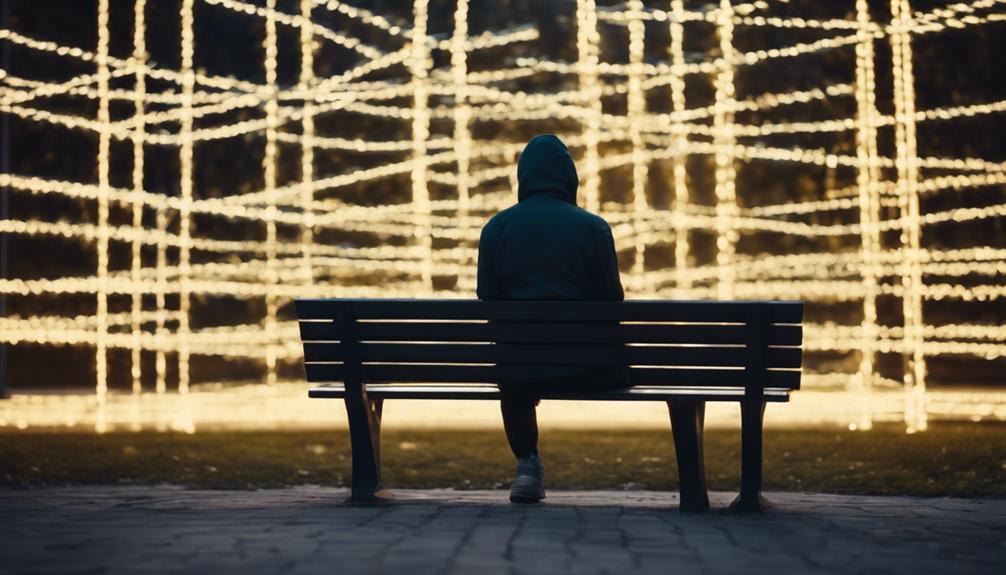
Emotional unavailability in partners often arises from past traumas, hindering the formation of deep connections in relationships. When individuals carry unresolved emotional baggage or harbor trust issues, they may struggle to fully engage in a relationship, impacting the love and connection shared.
This emotional unavailability can be rooted in a fear of vulnerability and intimacy, leading to a lack of communication, empathy, and intimacy within the partnership. The reluctance to open up and commit can impede the development of healthy and fulfilling relationships.
In these cases, partners may exhibit behaviors that signal emotional unavailability, such as distancing themselves emotionally, avoiding serious conversations, or showing a reluctance to invest in the relationship long-term.
Overcoming emotional unavailability requires patience, understanding, and often professional support to address underlying traumas and fears that hinder the ability to form deep and meaningful connections with a partner.
Impact of Ghosting and Breadcrumbing

The impact of ghosting and breadcrumbing in modern dating culture is significant, shaping how individuals perceive and navigate relationships. These behaviors have become prevalent in today's dating landscape, causing emotional turmoil and uncertainty for many. Here's how ghosting and breadcrumbing influence the dating experience:
- Ghosting: Abruptly cutting off communication without explanation, leaving the recipient confused and hurt.
- Breadcrumbing: Using intermittent attention to maintain interest without genuine commitment, creating false hope.
- Prevalence: Over 80% of young adults have experienced ghosting or breadcrumbing, highlighting the widespread nature of these behaviors.
- Emotional Impact: Feelings of rejection, insecurity, and distress often result from being ghosted or breadcrumbed, affecting mental well-being.
The ease of digital communication has facilitated the rise of ghosting and breadcrumbing, enabling individuals to avoid uncomfortable confrontations or commitments, further complicating the dating landscape.
Lack of Authenticity in Online Interactions

Exploring the world of online dating can be challenging due to the prevalent lack of authenticity in digital interactions. On dating apps, individuals often present an idealized version of themselves, portraying characteristics they believe will impress potential partners. This behavior, pretending to be someone else, is a common occurrence in the domain of digital dating.
The fear of judgment and rejection further exacerbates this lack of genuine self-expression in online interactions. Users feel pressured to conform to societal expectations, hindering the development of authentic connections on dating platforms.
The difficulty lies in finding partners who appreciate one's true self amidst the sea of curated profiles and exaggerated personas. This struggle to showcase authenticity in online interactions can lead to disillusionment and frustration in the search for genuine connections and meaningful relationships.
In a landscape where genuine expression is often overshadowed by societal pressures and the desire to fit an idealized mold, fostering true authenticity in online dating remains a significant challenge.
Pressure to Conform to Idealized Relationships
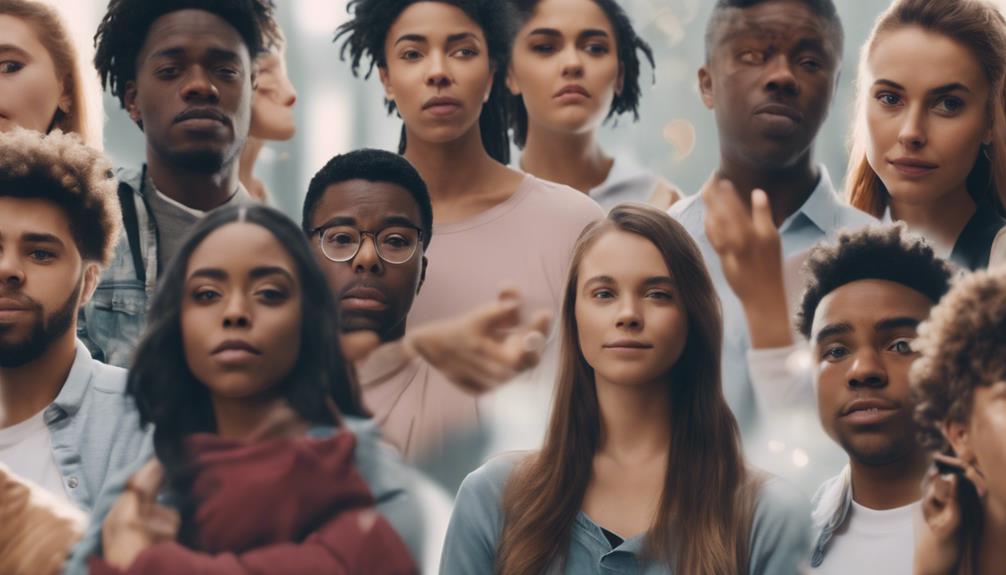
Getting through the dating scene can feel overwhelming due to the pressure to conform to idealized relationship standards. Societal pressures and gender stereotypes often shape how individuals view and pursue relationships.
Here are some key factors contributing to this challenging environment:
- Cultural Expectations: Society imposes rigid norms on how relationships should unfold, leading to stress and anxiety for those seeking love.
- Stigma of Singleness: The stigma attached to being single at a certain age can compel individuals to settle for relationships that may not align with their true desires.
- Familial Influence: Family and peer expectations can heavily influence decisions regarding relationships, sometimes causing individuals to conform to societal standards against their wishes.
- Self-Doubt: The pressure to fit into idealized relationship molds can breed feelings of inadequacy and self-doubt, hindering genuine connections.
Navigating these societal pressures and stereotypes can make finding authentic love a challenging endeavor.
Frequently Asked Questions
Why Is Finding Love so Hard Nowadays?
Finding love is challenging due to overwhelming options and swiping fatigue. Stress about love lives is common, complicating the dating landscape. A guide on free dating sites aids in navigation, and rating methodologies enhance decision-making.
Why Dating Is Harder Now Than Ever Before?
In today's world, dating feels tougher due to digital distractions and societal expectations. You struggle to connect deeply amidst endless options and unrealistic standards. Clear communication is key. Be patient with yourself.
Why Is It Harder for Me to Find Love?
You struggle to find love due to modern dating complexities like overwhelming options, lack of genuine connections, and societal pressures. Focus on authenticity, self-awareness, and clear communication to navigate the dating landscape effectively.
Why Is Dating in 2024 so Hard?
Dating in 2024 is hard due to the overwhelming burnout from dating apps and the stress around love lives. The best free dating sites guide and platform ratings help you navigate this challenging landscape with clarity.
Are the Challenges of Dating After Narcissistic Abuse Contributing to the Difficulty of Finding Love in 2024?
Navigating the dating world after narcissistic abuse can be daunting. The shocking truths about dating after narcissistic abuse can create barriers in forming new connections. It’s understandable that individuals may struggle to find love in 2024. Overcoming these challenges requires patience, self-care, and seeking support from understanding partners.
Conclusion
To wrap up, the challenges of dating in 2024 are deeply rooted in societal shifts and technological advancements.
The symbolism of a tangled web represents the complexities of modern relationships, where communication, authenticity, and emotional availability are often lacking.
As you navigate the dating landscape, remember to approach with caution, set realistic expectations, and prioritize genuine connections over fleeting interactions.
The journey to finding love may be fraught with obstacles, but perseverance and self-awareness will ultimately lead to fulfilling relationships.










